
Featured Blog | This community-written post highlights the best of what the game industry has to offer. Read more like it on the Game Developer Blogs or learn how to Submit Your Own Blog Post
Getting your big break - 2021 edition (Video game music composer)
Composer Winifred Phillips explores strategies for new composers to land their 1st game - with tips on educational resources, developing a solid reputation, cultivating a network of contacts, & surfacing opportunities. Resources list included.

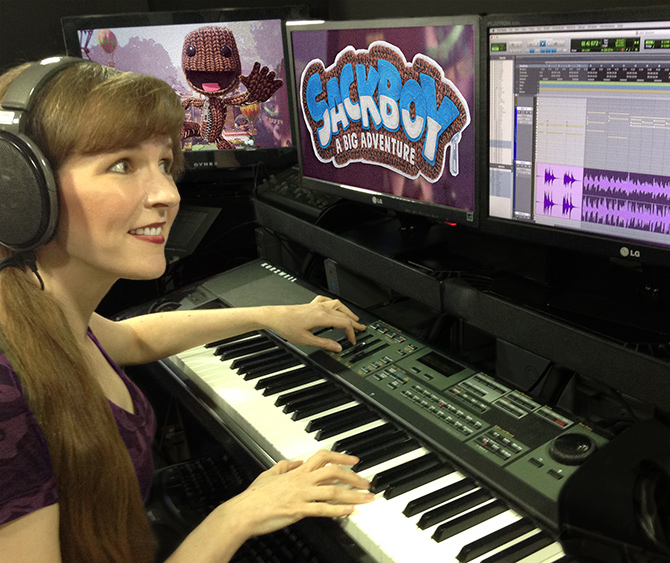
By Winifred Phillips | Contact | Follow
Delighted you're here! I'm video game composer Winifred Phillips, and this past year has been particularly busy for me. I've released several projects this year, including Sackboy: A Big Adventure (my latest, pictured above) – and I'm very pleased that my Waltz of the Bubbles composition from Sackboy: A Big Adventure just won a Global Music Award, and is nominated along with the rest of the game's soundtrack in this year's NAVGTR Awards! In between projects, I've given three virtual talks this past year at the Game Developers Conference in March, the VGM Academy Live event in April, and the GDC Summer event in August. Popular events like these are great opportunities to touch base with the community and exchange ideas about the art of game composition and the business of being a video game composer.
All during this time, I've been keeping up with this blog, writing monthly articles that explore different topics of interest to us as game composers. In addition to the regular monthly entries, every year I write an article that tries to answer the question, "how does an aspiring composer break into the video game industry?" This is the question I'm personally asked most often, and it's one I always struggle to answer.
Part of the reason for this is that my own "breaking into the business" story is so unusual. My first video game project happened to be a triple-A blockbuster (God of War from Sony Interactive),  and I was able to land the gig because an example of my work landed on the desk of a music supervisor for the project at exactly the right time. What are the chances of that? It's akin to being struck by lightning, and I certainly can't advise young composers to depend on that kind of lightning to strike. But I don't want to leave hopeful young composers in the lurch either.
and I was able to land the gig because an example of my work landed on the desk of a music supervisor for the project at exactly the right time. What are the chances of that? It's akin to being struck by lightning, and I certainly can't advise young composers to depend on that kind of lightning to strike. But I don't want to leave hopeful young composers in the lurch either.
So every year, I revisit the subject, trying to learn what helpful advice might be offered by virtue of the common wisdom that exists at the time. In expert articles and community posts, the subject is ceaselessly examined and reconsidered. It's an evolving conversation that shifts in subtle but appreciable ways from year to year. So this is the 2021 edition, in which I share the interesting observations I've gathered from online sources during the previous year. Hopefully, this article will provide some guidance and support for those who are embarking on their own game music careers. But first, in case anyone might like to hear a fuller retelling of my own "breaking into the business" story, here's an interview I gave in 2011 with GameSpot in which I recount how I landed my first gig. The relevant discussion begins at 4 minutes and 15 seconds:
So now, let's start exploring some of the advice and observations that have been shared across our game music community during the past year. In these articles and online conversations, I've noticed a few common threads that I'll try to tie together. These include some objectives and goals that we need to obtain in order to succeed – some things that we have to get. So I've arranged this article accordingly, under these headings:
Getting the education
Getting the reputation
Getting the contacts
Getting the chance
Getting fired up
So let's start with the first item on the list:
Getting the education
 When embarking on any career, education is always a pressing concern from the outset. However, this seems to be a pretty controversial subject in regards to the career path of an aspiring composer. Especially this year, I've noticed a lot of ambivalence and differing points of view on the subject of formal education for game composers.
When embarking on any career, education is always a pressing concern from the outset. However, this seems to be a pretty controversial subject in regards to the career path of an aspiring composer. Especially this year, I've noticed a lot of ambivalence and differing points of view on the subject of formal education for game composers.
Of course, any educational institution will be happy to endorse the higher-education path for game composers. "Formal education and experience are keys to success here," asserts the Berklee Online TakeNote blog. "Being a great composer means understanding the technicalities and mechanics of music on multiple levels."
As one might expect, that sentiment is echoed by many other educational institutions. "A fantastic way to separate yourself from thousands and thousands of self-taught musicians and producers is by earning a reputable music degree," claims the blog of the Atlanta Institute of Music & Media. "This will also increase your chances for higher pay when you land yourself a career in music."
This idea seems to be supported (at least in part) by the latest edition of the Game Audio Industry Survey, which gathers information about the state of the industry on a fairly regular basis. Out of every ten respondents to the latest edition of the Game Audio Industry Survey, eight reported having bachelor's degrees or higher. However, this information only pertained to salaried game audio team members. It is worth noting that out of those degree-earning game audio pros, three-quarters of them had obtained music degrees. The survey also reports that "one in 3 audio employees at game companies compose music, most of whom also perform other duties."
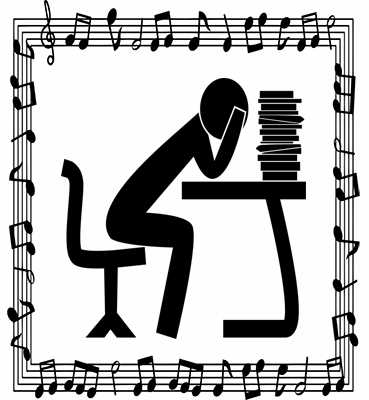 This would seem to suggest that aspiring game composers would be well served by pursuing a degree in music. On the other hand, the Game Industry Career Guide begs to differ. Lumping composers and sound designers together under the term "audio engineer," Jason Bay of the Game Industry Career Guide asserts that "most of the Audio Engineers that I’ve met are self-taught, although there are audio engineering schools that you can attend to get targeted training."
This would seem to suggest that aspiring game composers would be well served by pursuing a degree in music. On the other hand, the Game Industry Career Guide begs to differ. Lumping composers and sound designers together under the term "audio engineer," Jason Bay of the Game Industry Career Guide asserts that "most of the Audio Engineers that I’ve met are self-taught, although there are audio engineering schools that you can attend to get targeted training."
Delving into discussions amongst the mostly-anonymous online community yields somewhat different results, as the attitudes about formal education become much more circumspect. In a Reddit thread about pursuing a career in game music composition, user FizzleFry186 observes that "people go to music school for the prestige and the alumni network, as well as the education. You don't necessarily need it, but it definitely helps you get gigs and put a little more weight behind your name."
This non-committal attitude was echoed throughout the Reddit thread. "Go to school for something tangentially related - coding or whatever - and then do a music minor that focuses on comp or 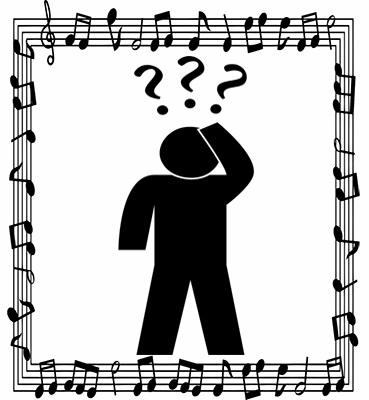 performance or whatever hole you have in your education," advises Reddit user Ragfell. "You’ll be better for both experiences."
performance or whatever hole you have in your education," advises Reddit user Ragfell. "You’ll be better for both experiences."
As a counter to this argument, Reddit user Dogsarefun argues that "there’s a reason that almost all professional artists, graphic designers, illustrators etc have some kind of formal training. And that’s because it’s really hard to get to that level of work without the guidance of professionals in that industry, without the critique process and without the environment to grow."
As in previous years, it seems that this subject remains controversial. Nevertheless, there does seem to be a consensus now that higher education affords an aspiring game composer with a respectability and authenticity that we'll hereafter label as "professional stature." This leads us directly to our next goal as aspiring game composers:
Getting the reputation
How do we obtain that elusive "professional stature" if we haven't yet landed our first gig? What can we do to create a reputation for quality and reliability, if we haven't had the chance to demonstrate those qualities on-the-job?
For a long time, the consensus answer to this question centered on a composer's demo reel – their portfolio of sample recordings that represented the aspiring composer's "best foot forward." However, within the past year, the common wisdom seems to be moving gradually away from this demo-centric approach.
 Certainly, demo reels aren't going away, and are still considered important by many. One article I read this year was particularly eye-opening in terms of how indie-developers think about the music needs of their games. In an article posted in a blog maintained by the Xsolla company, freelance sound designer Taj Wheeler stresses that "you should consider whether the composer is capable of creating fitting compositions." The article stresses that developers need to be careful when working with composers. "You won’t know how the music will sound until they send you demos or a final track... Before you begin, evaluate if your game needs a composer, if it’s the right time to approach one, how to choose one, and how to work with them." This article is particularly interesting for composers attempting to understand why young developers may be extra cautious when hiring composers. In these circumstances, it would seem that demo reels take on heightened importance.
Certainly, demo reels aren't going away, and are still considered important by many. One article I read this year was particularly eye-opening in terms of how indie-developers think about the music needs of their games. In an article posted in a blog maintained by the Xsolla company, freelance sound designer Taj Wheeler stresses that "you should consider whether the composer is capable of creating fitting compositions." The article stresses that developers need to be careful when working with composers. "You won’t know how the music will sound until they send you demos or a final track... Before you begin, evaluate if your game needs a composer, if it’s the right time to approach one, how to choose one, and how to work with them." This article is particularly interesting for composers attempting to understand why young developers may be extra cautious when hiring composers. In these circumstances, it would seem that demo reels take on heightened importance.
This attitude toward the importance of composer portfolios doesn't radically change as the game developers become more established, either. "The best thing to do if they don’t have any experience at all is to put together a reel," advises Brandon Young (director of music affairs at Activision Blizzard).  "Pull images off YouTube, do your own spec score to it. Especially if it’s things I want to be seeing, like a clip of Call of Duty: Mute it, do your own score to it, see how that comes across. If you’re trying to convey a few different styles, a minute and a half, two minutes each."
"Pull images off YouTube, do your own spec score to it. Especially if it’s things I want to be seeing, like a clip of Call of Duty: Mute it, do your own score to it, see how that comes across. If you’re trying to convey a few different styles, a minute and a half, two minutes each."
Brandon Young also offers a warning about the size of demos and the manner in which they might be submitted. "There’s only so much I can, or want to download," he says. "If they email me a 20Mb file that jams my inbox, it discredits them and I’m going to delete the attachment."
That sentiment has also filtered into community Reddit threads on the subject, particularly when considering the value of a formal education. "Everyone tells you that the degree doesn’t matter, it’s your work, your portfolio," asserts Reddit user Dogsarefun.
However, for every mention of demo reels and portfolios, there are also assertions that the current industry no longer places as much importance on these items as they once did.  "Your website is more likely to get attention than your demo reel, and nobody can throw your website into the trash." asserts the Connolly Music blog.
"Your website is more likely to get attention than your demo reel, and nobody can throw your website into the trash." asserts the Connolly Music blog.
This focus on web building/marketing skills is affirmed in the Reddit community as well. "I'd strongly recommend you learn about digital marketing, SEO, PPC, copywriting, and Photoshop/affinity and video editing," recommends Reddit user ALeakyTeapot. "You will save a crap ton of money on advertising and if it all falls through, have marketing skills that are in demand. Plus, understanding what is being done if you talk to a 3rd party marketing team means you're less likely to get scammed. The more skills you have, the further ahead you'll be."
The Connolly Music blog further emphasizes this approach. "Instead of handing out CDs to every video game developer you meet at conferences and meetups, focus on building a professional, brand-oriented website and social media channels."
Expanding on that idea, the UJAM blog suggests that demo reels should be used for networking and getting contacts in the online community, rather than for traditional job-hunting. "You must post your film/TV/game music online for people to know you exist, but to get people to engage with you: ask for feedback, not work. They’re much more likely to give you the former."
Getting the contacts
The importance of networking over demo submission certainly seems to be a recurring theme this year.  As Redditor Regfell affirms, "On the gig training and personal connections (many independent of school) have been the primary drivers of my current career trajectory."
As Redditor Regfell affirms, "On the gig training and personal connections (many independent of school) have been the primary drivers of my current career trajectory."
So let's explore that further. How can we gather those all-important personal connections? The UJAM blog suggests that aspiring composers join and/or start online conversations "through Facebook Groups, Instagram posts (you can search hashtags used by creators and developers and leave comments on their posts), and other places your potential clients are already actively participating. Do not ask for work; give helpful feedback, compliments, and talk about the music they’re using (or lack thereof)–as long as you’re genuinely being helpful to them. Resist the urge to pitch yourself, because they probably won’t be receptive until they know and like you."
This idea pops up again in a podcast posted by Dan Hulsman of the VGM Academy. "If you're actively engaging and listening in on conversations, if you're listening to what other people are saying, absorbing and interacting and talking back to them about what they're saying and what's interesting to them – they're going to say, 'hey, that guy or gal - they're good people. We had a good conversation.' And that's what you want. And you want to make that happen a lot of times over a long period of time to build relationships."
"In the creative industry as a whole, it’s far more valuable to think of networking as making friends, not connections," explains the UJAM blog. "Creators tend to only work with people they enjoy being around, so make a positive impression above all else. The more people you engage with on a personal level, the more you can slide what you do into conversation, and the more they’ll be excited to hear about it. A large network equals a lot of potential opportunity!"
 Dan Hulsman takes this idea to its logical conclusion. "When an opportunity comes up on their end and they need someone like you, you're much more likely to come to mind and they're going to be much more comfortable with the idea of bringing you into the fold because they know, like and trust you." Hulsman goes on to warn, "that takes time, and it takes effort, and it takes a lot of work."
Dan Hulsman takes this idea to its logical conclusion. "When an opportunity comes up on their end and they need someone like you, you're much more likely to come to mind and they're going to be much more comfortable with the idea of bringing you into the fold because they know, like and trust you." Hulsman goes on to warn, "that takes time, and it takes effort, and it takes a lot of work."
So, what is this process like from the other side? "I try and keep of list of people I meet," shares Brandon Young of Activision Blizzard, "who are friends of friends of friends. I used to dig on my own, but that’s not necessary anymore. I’ve been doing this job for so long, I stay ahead of it with what people send me." Brandon Young offers this advice: "Research different publishers and see what their annual titles are, to clue you into what they’re doing the next year. There are unannounced things, but you can figure it out. You can find out who to reach out to by Googling who was involved in a particular game. It’s a small enough industry to figure out who the people are."
"Without a network of some kind, it’s almost impossible to get work," warns Malcolm Lindsay, owner of RiteMusic.co.uk. "However, it’s pretty difficult these days, because everyone is chasing this goal: you are competing not only with other media composers, but all the publishers and the pop world too. You need contacts in the industry to help you get noticed."
So, let's assume that we've undertaken this difficult task of building up a network of valuable contacts and nurturing friendships. We've committed to taking the considerable time necessary to develop these mutually-altruistic relationships while fastidiously avoiding any overt appeals. Eventually, we're going to have to ask about gig opportunities, but we've decided to wait until the time is right. In the meantime, we can't just spend all our time making friends on social media and creating music for our web sites. Without any real-world experience, we're simply not going to be a desirable commodity when our carefully-nurtured network of friends blossoms into potential working relationships. So the question remains – how do we get our first gig? Who is going to take a chance on us?
Getting a chance
As has been the case in previous years, one of the most common pieces of advice regarding getting the first gig is to eschew payment and donate our music services to speculative projects (otherwise known as working for free). Some evensuggest that aspiring game composers start donating their services even before completing their degrees.
"If you’re currently in college or just out," advises the Connolly Music Company blog, "work to establish internships with recording studios, media centers, or gaming companies to help you gain professional networking experience as well as all the right references."
Malcolm Lindsay of RiteMusic.co.uk echoes that advice. "If you are just starting out and want to be a media composer, my advice would be to try and get to know people who make films / games, and where possible collaborate on speculative projects to get experience and make contacts that might be useful in the future."
One of the oft-mentioned ways to do this is through game jams. "If anyone’s interested in composing for video games than you literally should know what a game jam is as a lot of famous indie games (like for example Hollow Knight) come from those," says video game developer Luca Leonardi. "If a composer manages to create a soundtrack that takes the top spots in these kind of Jams… he’ll have a big chance of advertising him/herself in the gaming community. Also… when it’s Jam time you will find a LOT of developers looking for artist and composers and teaming up can be an absolutely awesome way to know people that might become “allies” in the future."
This advice has also popped up frequently in the online community. "One of the best ways to get into game music is to become a "floater" composer at game jams," suggests RNieto on the Vi-Control.net boards. "A game jam is basically a bunch of development teams making games over a weekend, without a break. There is usually one sound designer and one composer (or a single sound designer/composer) providing all the music and sound for all of those games, kind of "floating" from one team to the next, working at a crazy fast pace to get everything done as best as possible before time runs out."
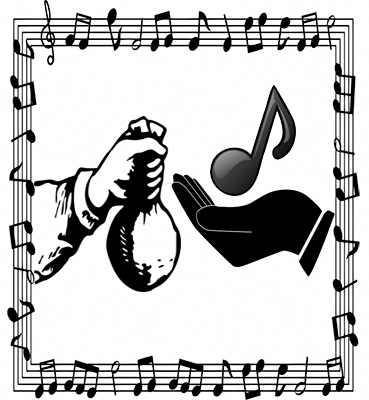 While working for free and participating in game jams can afford an aspiring composer with the opportunity to build a portfolio, there are risks involved. "If you are new in the game with little experience you are obviously probably going to have to settle with a lower rate. But never work for free!" says Mattias Holmgren, Creative Director of Morningdew Media. "Let’s say this again, loud – Never work for free! It might stab you in the back for a long time. Of course it’s perfectly fine to exchange services with a client. But just don’t work for free… Just don’t! A client who receives a service for free, will expect that service to be free in the future, too."
While working for free and participating in game jams can afford an aspiring composer with the opportunity to build a portfolio, there are risks involved. "If you are new in the game with little experience you are obviously probably going to have to settle with a lower rate. But never work for free!" says Mattias Holmgren, Creative Director of Morningdew Media. "Let’s say this again, loud – Never work for free! It might stab you in the back for a long time. Of course it’s perfectly fine to exchange services with a client. But just don’t work for free… Just don’t! A client who receives a service for free, will expect that service to be free in the future, too."
Mattias Holmgren suggests a novel approach here – the exchange of services with prospective clients that don't have the resources to pay fees for our work as game composers. Considering the increased emphasis on internet presence, including glossy professional web sites and marketing materials, it's possible to imagine that an aspiring composer might trade their work in exchange for web design, marketing or video services. It's an interesting possibility to consider, and one that preserves the perception that our work has value and that we should be compensated for it.
So now we've explored the importance of getting an education, a reputation, a network of contacts, and a chance to show what we can do. So let's look at one last objective – one last thing that we need to get.
Getting fired up
After considering all of the obstacles and difficulties involved in launching a career as a game composer, it's natural to feel a little daunted. However, we can't let that show when we're reaching out to prospective clients, conversing with our community on social media, or meeting in person (which will certainly happen again someday). Regardless of how difficult this whole endeavor proves to be, we've got to remember that our enthusiasm may be just as important as our talent, our education, or our skills.
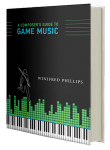 This idea was a recurring theme in online discussions and articles this year. In my book, A Composer's Guide to Game Music, I touched on the importance of enthusiasm as it pertains to young composers trying to land their first video game gig. "As composers, we feel passionately about our jobs. This passion drives our daily workflow and inspires the creative decisions we make. Emotions such as this can be helpful to us when we’re meeting with possible clients, but only when well controlled through a disciplined and organized presentation. Some of our prospective employers may appreciate raw enthusiasm, but this sort of eagerness also has the potential to scare some people off. What we need is the ability to gracefully articulate our enthusiasm while at the same time impressing developers and publishers with our thorough professionalism."
This idea was a recurring theme in online discussions and articles this year. In my book, A Composer's Guide to Game Music, I touched on the importance of enthusiasm as it pertains to young composers trying to land their first video game gig. "As composers, we feel passionately about our jobs. This passion drives our daily workflow and inspires the creative decisions we make. Emotions such as this can be helpful to us when we’re meeting with possible clients, but only when well controlled through a disciplined and organized presentation. Some of our prospective employers may appreciate raw enthusiasm, but this sort of eagerness also has the potential to scare some people off. What we need is the ability to gracefully articulate our enthusiasm while at the same time impressing developers and publishers with our thorough professionalism."
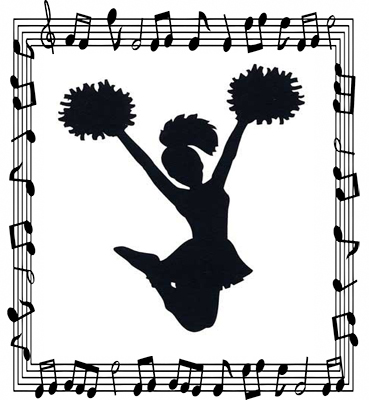 In online articles and community posts this past year, the topic of enthusiasm popped up fairly often. According to this year's common wisdom, when a developer works with a composer it becomes vitally important that both sides of the collaboration work to maintain a steady level of positive energy throughout the process. "Enthusiasm is important," advises the XSolla blog, "as it can carry you both through the hard periods of work." XSolla reminds developers that the attitude of composers is as important as their abilities. "If they’re excited to work on your game, it’s a good indication that the music will reflect that."
In online articles and community posts this past year, the topic of enthusiasm popped up fairly often. According to this year's common wisdom, when a developer works with a composer it becomes vitally important that both sides of the collaboration work to maintain a steady level of positive energy throughout the process. "Enthusiasm is important," advises the XSolla blog, "as it can carry you both through the hard periods of work." XSolla reminds developers that the attitude of composers is as important as their abilities. "If they’re excited to work on your game, it’s a good indication that the music will reflect that."
When reaching out to a prospective client, an aspiring composer may want to demonstrate their enthusiasm in a direct way in their initial communications. "I always start with something like "Your game looks great," mentions Vi-Control.net community member Haakond on the site's active community boards. "But I never write something I don't mean, I am always honest."
Even for audio directors at the peak of their profession and working within triple-A publishers, that intangible energy transmitted by enthusiasm is still important. This can be displayed by simply checking in diligently and pursuing a targeted approach. "Sometimes I’ll flag people who are checking on certain things to get back to them," shares Brandon Young of Activision Blizzard. "If someone feels like they have the right skill set for certain projects, they should approach companies that are doing things [that match] their skill set."
Conclusion
So there we have it! I hope you've found something in this article that might be helpful. Below, I've included a list of all the sources from which the above quotes were excerpted. Also, I've included an expanded list that includes links to all the articles I've quoted in previous incarnations of this yearly article. Thanks very much for reading!
The List
Here's the full list of links to resources that may help a newcomer trying to break into the business. Some of these links were the source of the quotes we discussed earlier in this article. The rest come from articles on this topic that I've written in previous years.
Resources Quoted in this Article
Top 10 Careers in the Music Business (and How Much Money You Can Make)
by Berklee Online
Should I Get a Music Degree? 4 Reasons to Earn a Music Degree
by the Atlanta Institute of Music & Media
Game Audio Industry Survey 2019
by GameSoundCon
All Careers in the Video Game Industry
by the Game Industry Career Guide
Questions About Pursuing Music as a Career
by WeAreTheMusicMakers, Reddit.com
Music For Your Game: What You Need To Know
by the Xsolla Blog
How to get your music featured in video games
by Electronic Musician, MusicRadar.com
Composing Music for Video Games: What's the Score?
by the StringOvation Team, ConnollyMusic.com
How to Score Music for Games and Film
by the UJam Blog
AUDIO: The Biggest Social Media Mistake I See Composers Making
by Dan Hulsman, the VGM Academy
Top Tips / Advice
by Songwriters & Composers Scotland Magazine
Videogame Music from a Game Developer Point of View
by Luca Leonardi, ProfessionalComposers.com
How to start "from zero"? What steps to do to get into game music composing?
by the VI Control "Working in the Industry" Bulletin Board
How much should You Charge To Compose Original Music
by Mattias Holmgren, MorningDewMedia.com
Archived Resources
Film, TV, Games Composer - 10 Strategies To Succeed
by Christian Henson, YouTube
Don't D-I-E at GDC: Getting the Most Out of the Game Developers Conference
by Ryan Ike
Planning my game-audio education
Music for Games Forum, GearSlutz.com
Getting Started
GameAudio SubReddit
About the upcoming GDC 2020 SF
GameAudio SubReddit
MUSIC INDUSTRY TIPS: DO'S AND DON'TS OF BREAKING INTO VIDEO GAME MUSIC
by Chris Lines, Music Connection Magazine
6 Skills You Need to Compose Video Game Soundtracks, According to the Pros
by Dante Fumo, Reverb.com
Game Audio Industry Survey 2019
by GameSoundCon
How to get into music/audio
Music and Sound FX Forum, GameDev.net
GDC 2018: Audio Bootcamp XVII: Reel Talk
by Matthew Marteinsson and Kevin Regamey, GDCVault.com
(Subscription required for access)
Yet Another Game Audio Hiring Article
by Ariel Gross, Gamasutra.com
Preparing a Professional-Looking Portfolio - A Composer's Guide
by Daniel Spreadbury, Blog.Dorico.com
The Game Audio Career
by Nathan Madsen, GameAudio101.com
How can I start my career in video game audio?
by Jason W. Bray, GameIndustryCareerGuide.com
Networking at a Game Convention Part 1: The Calm Before the Social Storm
by Rocky Kev, Black Shell Media
Make Some Noise! Getting a Job Creating Sound and Music for Videogames
by Will Morton, Gamasutra.com
How did you get your first job?
GameAudio Reddit Community Discussion
Finding a game industry job - networking and adding value
by Akash Thakkar, YouTube
Getting Started as a Video Game Composer
by Bobby Prince, BPmusic.com
Where does an amateur composer find job, or is he heard?
Northern Sounds community discussion
How to Wrangle a Job Writing Music for Computer Games
by Lance Hayes, Andertons Music Co.
GDC 2011 Talks #1: Tips for Prospective Video Game Composers
by Laura Shigihara, SuperShigi.com
How to get a gig as a Game Music composer
by Brian Schmidt, Sound On Sound
How to be a video game music composer – Tips from the pros
by Sophia Tong, GamesRadar.com
Music in the Gaming Industry – Getting a Job as a Game Composer
by Nelson Everhart, Kingsisle Blog
I want to be a game composer
GameDev.net community discussion
Game Developers and Music Composers – How do you network?
TIGForums community discussion
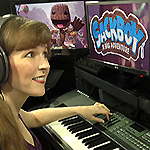 Popular music from composer Winifred Phillips' award-winning Assassin's Creed Liberation score is currently featured in the performance repertoire of the Assassin's Creed Symphony World Tour, which kicked off in Paris with performances by a top 80-piece orchestra and choir. As an accomplished video game composer, Phillips is best known for composing music for games in five of the most famous and popular franchises in gaming: Assassin’s Creed, God of War, Total War, The Sims, and LittleBigPlanet. Phillips' latest project is Sackboy: A Big Adventure, recently released for PS5/PS4. She is the author of the award-winning bestseller A COMPOSER'S GUIDE TO GAME MUSIC, published by the MIT Press. As one of the foremost authorities on music for interactive entertainment, Winifred Phillips has given lectures at the Library of Congress in Washington DC, the Society of Composers and Lyricists, the Game Developers Conference, the Audio Engineering Society, and many more. Phillips’ enthusiastic fans showered her with questions during a Reddit Ask-Me-Anything session that went viral, hit the Reddit front page, received 14.9 thousand upvotes, and became one of the most popular gaming AMAs ever hosted on Reddit. Follow her on Twitter @winphillips.
Popular music from composer Winifred Phillips' award-winning Assassin's Creed Liberation score is currently featured in the performance repertoire of the Assassin's Creed Symphony World Tour, which kicked off in Paris with performances by a top 80-piece orchestra and choir. As an accomplished video game composer, Phillips is best known for composing music for games in five of the most famous and popular franchises in gaming: Assassin’s Creed, God of War, Total War, The Sims, and LittleBigPlanet. Phillips' latest project is Sackboy: A Big Adventure, recently released for PS5/PS4. She is the author of the award-winning bestseller A COMPOSER'S GUIDE TO GAME MUSIC, published by the MIT Press. As one of the foremost authorities on music for interactive entertainment, Winifred Phillips has given lectures at the Library of Congress in Washington DC, the Society of Composers and Lyricists, the Game Developers Conference, the Audio Engineering Society, and many more. Phillips’ enthusiastic fans showered her with questions during a Reddit Ask-Me-Anything session that went viral, hit the Reddit front page, received 14.9 thousand upvotes, and became one of the most popular gaming AMAs ever hosted on Reddit. Follow her on Twitter @winphillips.
Read more about:
Featured BlogsAbout the Author(s)
You May Also Like

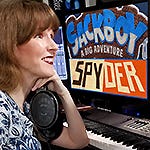





.jpeg?width=700&auto=webp&quality=80&disable=upscale)








